- Home
- Jeff Mariotte
The Burning Season Page 2
The Burning Season Read online
Page 2
“You’re right,” Ray said. He watched the ACO close in on the dog. He couldn’t get to his knees under there, couldn’t lift the slumbering animal, so he settled for grabbing its collar and one upper leg and backing out the way he had gone in, dragging Booger behind him. Sweat rolled off the man’s forehead.
They would still collect any bits of the hand they found under there, and soil samples, but he thought it was all too contaminated to be much good.
When the ACO came out, he tenderly lifted the dog and held it out toward the woman. “He’ll be okay in a little while,” he said.
She kept her hands by her sides. “Put it on the porch.”
“Lady loves that dog,” Nick whispered.
“No wonder the husband left.” Ray lowered himself gingerly to one knee. “Guess I’ll get the hand.”
“I’ll get it,” Nick said quickly. He pointed toward Ray’s cane with his chin, probably unconsciously. The whole team had been good about not reminding Ray of the stab wounds he had suffered at Nate Haskell’s hands, the loss of a kidney, but he knew nonetheless that none of them had forgotten. The truth was, though he was mostly recovered, they did still hurt all the time. He had winced, getting down on his belly to look at the dog, and again getting up. He was glad to let Nick fetch the hand.
“Thanks,” he said.
“No problem.”
Nick took his field kit under the house with him, although it was awkward going. He was thinner and fitter than the ACO, but there still wasn’t a lot of room. Ray, on hands and knees, tried to help by beaming his flashlight where Nick needed it.
Nick took forceps from his kit, and small evidence bags, and plucked what Ray could only guess were bits of shredded skin from the ground. Finally, he reached the hand, which he lifted with a piece of sterile paper and placed into a paper bag. Most people, Ray thought, would have put it in plastic—that had been his inclination, when he had started this job. But plastic trapped moisture, and a moist body part in an airtight bag was a perfect cauldron for growing all sorts of bacteria. Paper would breathe.
When Nick emerged, sweating and filthy, Ray changed places with him and went back under, though not nearly as far and wincing all the way, for some soil samples. As he had told Nick, he didn’t believe this was the original scene—the dog had initially been spotted carrying the hand more than a block away. He had only brought it here because this was home, and he knew he could gnaw in peace under the house. They needed samples, regardless.
By the time Ray came out, pain lancing from his ribs and back, Nick had cleaned up as much as he could. He still held the bagged hand. “How does it look?” Ray asked.
“It’s pretty much a mess. That mutt really mangled it. Of course, we don’t know what shape it was in to begin with.”
“True.”
“So much epidermis is gone, I can’t even make out the skin color.”
“Can you tell if its separation was natural or forced?”
“You mean, did someone cut it off? Have to check that at the lab, I didn’t take that close a look.”
“Well, I didn’t see any other body parts in there. It’s going to be hard to get much off it, in the condition you describe. There might not even be any ridge impressions left.”
“Didn’t see any.”
“And the way that dog was slavering all over it, any DNA we get from the tissue will be suspect. Maybe Doc Robbins will be able to come up with something for us to test.”
“He’ll love having a severed hand to work with.”
“I’m sure.”
“You know what’s worse?” Nick asked.
“What?”
“He might be getting used to them.”
That fact had slipped Ray’s mind. The whole scenario, with the dog under the house, had driven it from his thoughts. And, in his defense, he’d had a lot on his mind recently.
But Nick was right. Over the past few months, four other severed hands had shown up on the streets of Las Vegas. They weren’t exactly becoming commonplace, but they were no longer as rare as Ray would have liked.
“Let’s get out of here,” Nick said. “If he doesn’t want to deal with it, I’m sure someone will lend him a hand.”
Ray gave him a groan. “That was awful, Nick. I’d never have fingered you for a punster.”
Nick shook his head. “You win, Ray. Let’s go. If you promise not to make any more hand jokes, I’ll even let you drive.”
3
SHUTTING DOWN A major thoroughfare was always a problem. There was pressure from the mayor and police leadership to do the job fast and reopen the road. Traffic snarled around the closure, while nearby roads got more use than they could accommodate.
The good thing about this instance was that it was after midnight. But Las Vegas was truly a city that never slept. Even when it came to automobile traffic, the time showing on the clock was not the only consideration, or even the primary one.
The fact was, a crime scene on a city street took far longer to process than one nicely confined inside four walls. And Catherine Willows wouldn’t allow her people to be rushed. Rushing meant missing things, and the job of crime scene investigation required missing as little as humanly possible.
The street scene was a complicated one, made even more so by the nature of this particular crime.
Catherine was appreciative that there were some cops who understood that, and who made a point of siding with the Crime Lab against those who argued in favor of a quick resolution. One of those was Captain Jim Brass, whose resemblance to a bulldog had more to do with his persistence and demeanor than his physical appearance. Catherine found him standing with some other detectives, the mayor, and other city officials, and people she didn’t recognize, outside the trailer the LVPD had set up as a command post for the scene.
“Talk to me, Jim,” she said. “What’ve we got here? I mean, I know it’s a disaster, that goes without saying.”
“Glad you’re here, Catherine,” Brass said. He led her away from the clutch of people and toward the mess on the street. At each end, onlookers and media had been sealed out by yellow crime scene tape and rows of uniformed cops.
“I brought Sara and Greg. Earl’s meeting us here. It’s been a quiet night, so far.”
“Good thing. We’ll need everyone, especially Earl.”
“That’s what I figured.” Earl was a longtime explosives tech. He was called crusty by his friends—antisocial by the less generously inclined—but he knew his way around a bombing site.
“Ray and Nick are on their way to the lab with evidence in a different case, but they’ll join us if they can.”
“We can use the extra help. Here’s the scoop, Catherine. You know who Dennis Daniels is.”
Who didn’t? Daniels was one of Nevada’s wealthiest media moguls, a man who had turned a string of regional newspapers into a mini-empire that included TV stations and DCN, a twenty-four-hour cable news organization—not one that threatened the big three, but one that had made its owner a very wealthy individual. “Of course. Daniels Cable News—he made sure his name comes first in the title. Is he one of the victims?”
Brass nodded. “Story is he’s considering running for governor. He was returning to his office from what’s been described as a fundraising event at a private home in Lake Las Vegas. More like pre-fundraising, getting face time with some of the local movers and shakers who might finance him, if he decides to jump in. His entourage was in two vehicles.” Brass pointed to the two, both SUVs—except from here they looked like one oddly shaped mass, some sort of modern sculpture, asymmetric and resisting easy interpretation. “He’s already got the skeleton of a campaign staff in place, has some of the top people in Nevada politics locked up. Daniels and his campaign manager, Connie Pruitt, were in the Escalade. She’s the only political pro in this group—the others work for his media organization. The driver was a staffer named Bryan Donavan. Daniels has been traveling with a bodyguard, Garrett Kovash, and he was in front with D
onavan.”
“I’ve heard of Kovash,” Catherine said.
“Bodyguard to the stars. The Escalade was in front, and Maureen Cunningham, his adminstrative assistant, followed in that Ford Escape hybrid, driven by DCN manager of operations, Eldon Wohl.” Brass swept his arm around in the general direction of the freeway. “They exited I-15 at Charleston, then made the left on Las Vegas Boulevard, headed toward the downtown headquarters, where everyone but Donavan and Wohl had left their private cars.
“Just before they reached Gass Ave., a roadside bomb exploded.”
“A roadside bomb? Is this Las Vegas, or Baghdad?” Catherine asked.
“Maybe a desert is a desert is a desert,” Brass said. “Anyway, the blast picked the Escalade up and dropped it down on the driver’s side, which happened to be the side Daniels was sitting on. Wohl tried to brake, but his Escape plowed into the Escalade.”
With his description, Catherine got a better sense of how the two black SUVs lined up, or didn’t. She saw the Escalade on its side. The Escape had slammed into it at an angle. Probably Wohl had stomped on the brake and the vehicle had fishtailed before hitting the Escalade. The impact had shoved both vehicles toward the far side of the road, where traffic flowed basically southwest.
The vehicles would be difficult to process, all twisted steel and broken glass, no doubt full of blood and other fluids. But they weren’t the only problem, and maybe not the worst. The explosion had shattered the windows, and some of the street’s pavement was mangled, debris had flown everywhere.
“Injuries?” she asked.
“Only Kovash walked away under his own power,” Brass said. “But everybody’s walking away.”
“That’s something.”
“Yeah. Not going to make your job much easier, though. And paramedics had to use the Jaws of Life to open the Escalade.”
“Getting the injured out always takes precedence.” She believed that was the only way it could be. Employing the Jaws of Life, however, meant more debris, more contamination of the crime scene. As it was, paramedics would have been in a hurry to get to the victims, so they wouldn’t have been worried about compromising the evidence. They could track blood from one place, where it had been spilled, into another, where it hadn’t, throwing off the process of analysis. Same with other DNA evidence, even trace evidence, the dirt that got on their shoes, the plant material that clung to their pants legs. Analyzing a crime scene was like putting together a complex puzzle; every piece put into place affected those around it. When someone came through and scrambled the pieces, it got even more complicated.
Being a busy public street, Las Vegas Boulevard and the sidewalks flanking it were depositories of all manner of objects. Wads of gum, and gum wrappers. Cigarette butts, and wrappers. Candy wrappers. Beer and soda bottles. Plastic grocery bags. Plastic trash bags, empty and full. Used condoms. Oil stains. Bloodstains. Tire marks. Shredded tire. Torn newspaper. Various nails, screws, bolts, nuts, tacks. One half of a pair of pliers. The list was virtually endless.
And the investigators couldn’t know, until they hauled it all in and checked it out, what was important and what wasn’t. There was no way to know at a glance that this cigarette butt held the bomber’s DNA, while that one had been tossed aside by a tourist from Tennessee without so much as an outstanding parking ticket. That lamppost might hold the bomber’s fingerprints, or that newspaper box, or that piece of a Milky Way bar. It all had to be picked up, dusted, sprayed, and otherwise examined.
If an average crime scene was like a puzzle, then a scene like this was like putting together the world’s hardest puzzle without a box. Only by figuring out how the pieces went together could you see the final picture.
“Is there CCTV?” she asked. Las Vegas had more closed-circuit video cameras per capita than any other city in the country.
“There’s a camera at the pawn shop over there,” Brass said. “There’s one at the signal, on Gass. I haven’t seen the footage yet, but I imagine we’ll be able to see the bomb go off.”
“With luck, we’ll see the bomber.”
“We’ll need a lot of luck, so keep your rabbit’s foot handy. I don’t need to tell you, Catherine, there’s a lot of heat on this already. Daniels is rich and powerful. And he’s got a political agenda, which he makes sure DCN represents at every opportunity. If he runs, it’ll be as an independent, which means he pisses off people on both sides. But he brings a lot of attention to Nevada, which means the governor and both senators are going to be paying attention, not to mention the mayor and every media organization in the state—much as they’d like to pretend he doesn’t exist.”
“I had to wade through them to get here.”
“I know this is a tricky scene. I’ve got your back. You tell me what you need, what we can provide, and you’ll get it, even if I have to wash the sheriff’s car for a year.”
“I’ll try to make sure that doesn’t happen, Jim,” Catherine said. “And I appreciate the offer. You’re right, it’s going to be a big one. I hope Ray and Nick get here in a hurry. In the meantime, I think we’d better get started.”
“Keep me in the loop,” Brass said. He tossed her a smile and walked away, back toward the suits gathered around the command post. Catherine caught Sara Sidle’s attention and nodded toward the job ahead of them.
“Here he is,” the mayor said as Brass approached the group. He beckoned Brass over to the clutch of people around him, which included the Clark County sheriff, a slender young brunette wearing jeans and a worn WLVU sweatshirt, and an athletic blond man in a casual shirt and dark pants. Garrett Kovash stood slightly to the woman’s left. He was tall and movie-star handsome, his teeth polished and capped to perfection, his dark brown hair tousled just so—must have been hard, Brass thought, to come out of the accident that way. His clothes were torn and stained but there might have been a Teflon shield on his skin, for all the effects he showed. He could have broken concrete blocks with his jaw. “Captain Jim Brass, this is Joanna Daniels, Dennis’s wife.”
“Pleased to meet you,” Brass said, extending a hand. She looked at it for a good ten seconds before she shook it. Her eyes were rimmed with red, her nose chapped. “I’m sorry for the circumstances.”
“Me too, but they tell me he’ll be okay. He’s very strong.”
“If he can survive the TV business, he must be.”
“And this,” the mayor said, waving Brass’s attention toward the blond man, “is Brett Cunningham. His wife, Maureen, was in the car following Dennis.”
The man thrust his hand forward aggressively. He was in his late thirties, Brass estimated, and although he had not been crying, he was tense; a vein in his jaw throbbed like a tiny snake swallowing its prey. “Daniels’s administrative assistant,” Brass said. “Although from what I’ve heard, she’s much more than that . . . pretty much runs his life, according to the stories. Pleasure.”
The man didn’t speak, just gave Brass a quick shake and a quicker nod.
“You know Mr. Kovash, I think?”
“We’ve met.” Brass held his hand out toward the big man, who took it in a merciless grip. “Garrett.”
“Glad to see you on this, Jim. It’s terrible.”
“It is,” Brass agreed. “What about the other victims? Can I get contact information from someone, so I can make the notifications?”
“Donavan, who was driving Daniels’s vehicle, is single, as is Eldon Wohl,” Kovash said. “Connie Pruitt is married, but she and her husband live in Maine. I’m sure I can get you his number.”
“Good,” Brass said. “Thanks, Garrett.”
The mayor directed his attention toward Joanna Daniels. “Jim will be heading up the investigation. You couldn’t ask for better. He’s a cop’s cop, through and through.”
“I’m not sure if that’s a compliment or a curse,” Brass said. “But trust me, we will spare no effort getting to the bottom of this. The crime scene folks are already on it, and they’re the best we’ve got.
They’ll analyze the video, see if the perpetrator left behind any evidence, and—”
“There’s video?” Brett Cunningham asked.
“There are a couple of locations on the block with cameras that are pointed toward the street. If he’s on the video, that’ll be a big help, but it’s not absolutely necessary. Every criminal leaves traces of himself—or herself, as the case may be—at the scene.”
“You mean like DNA?” Cunningham asked.
“DNA, fingerprints, footprints, tiny flakes of skin. It could be almost anything. We’ve convicted people on the basis of pollen trapped in a pants cuff.”
“Didn’t put O.J. away.”
“That was more a matter of the trial than the evidence,” Brass said. He didn’t know which was worse—people who expected CSIs to be magicians, or those who assumed, mostly on the basis of that single case, that it was all an act, an illusion sold to feeble-minded juries but not scientifically sound.
The truth, he thought, was that it fell somewhere in the middle. Not every case could be closed with crime scene evidence, and sometimes the science was open to interpretation and debate. Other times, it was a lock, and no matter how defense attorneys tried to tear it down, it carried the day through the sheer accumulation of incontrovertible fact.
He turned toward Mrs. Daniels. “Can you think of anyone who might want to attack your husband in this way? I know every wealthy man has enemies, and those who dabble in the political world pick up even more, but they usually aren’t the kind who resort to violence. Has he received any threats?”
“All the time,” she replied. “More lately.”
“Are you kidding?” Brett Cunningham grabbed Brass’s arm. The detective shook his hand off, casually, without seeming to acknowledge the action. “All those protesters outside his office every day? I’ve been worried about Maureen for weeks. And Dennis, of course.”
“In our experience, the ones carrying picket signs aren’t usually the ones who commit violent acts,” Brass said. “If there have been threatening letters or e-mails to your home, Mrs. Daniels, I’d like to see them, please. And phone calls, if you’ve saved them.”

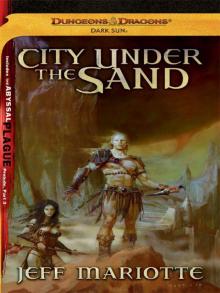 City Under the Sand
City Under the Sand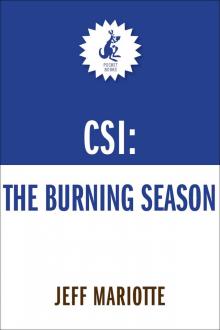 The Burning Season
The Burning Season Sanctuary
Sanctuary Winds of the Wild Sea
Winds of the Wild Sea Serpents in the Garden
Serpents in the Garden Close to the Ground
Close to the Ground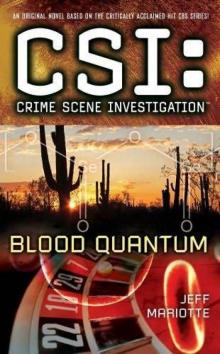 Blood Quantum
Blood Quantum Brass in Pocket
Brass in Pocket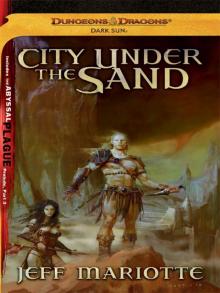 City Under the Sand: A Dark Sun Novel (Dungeons & Dragons: Dark Sun)
City Under the Sand: A Dark Sun Novel (Dungeons & Dragons: Dark Sun)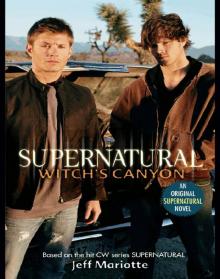 Witch's Canyon
Witch's Canyon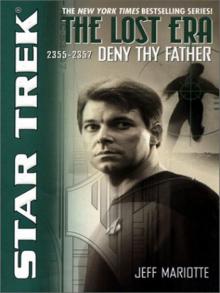 STAR TREK: The Lost Era - 2355-2357 - Deny Thy Father
STAR TREK: The Lost Era - 2355-2357 - Deny Thy Father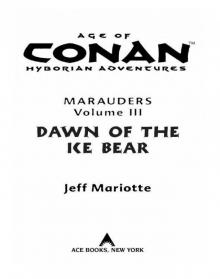 Dawn of the Ice Bear
Dawn of the Ice Bear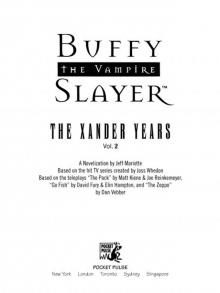 The Xander Years, Vol.2
The Xander Years, Vol.2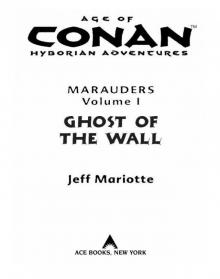 Ghost of the Wall
Ghost of the Wall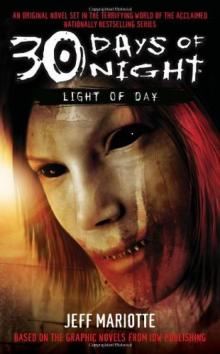 30 Days of Night: Light of Day
30 Days of Night: Light of Day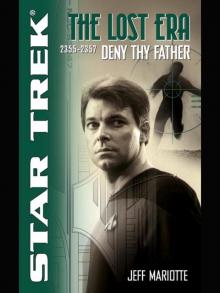 Deny Thy Father
Deny Thy Father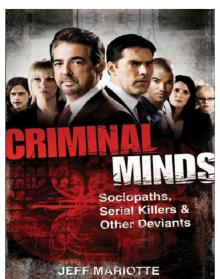 Criminal Minds
Criminal Minds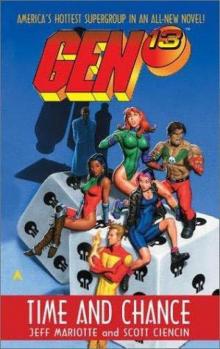 Time and Chance
Time and Chance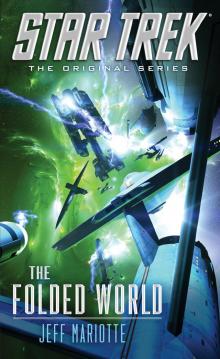 The Folded World
The Folded World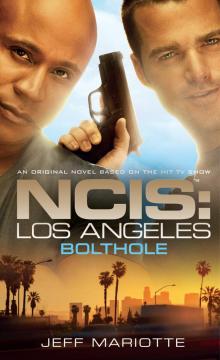 Bolthole
Bolthole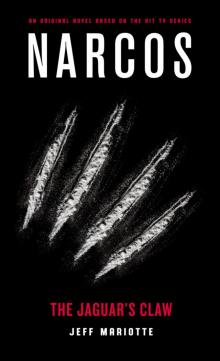 Narcos
Narcos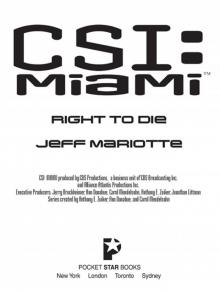 Right to Die
Right to Die